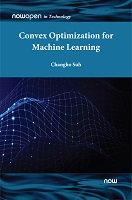Convex Optimization for Machine Learning
Abstract
This book covers an introduction to convex optimization, one of the powerful and tractable optimization problems that can be efficiently solved on a computer. The goal of the book is to
help develop a sense of what convex optimization is, and how it can be used in a widening array of practical contexts with a particular emphasis on machine learning.
The first part of the book covers core concepts of convex sets, convex functions, and related basic definitions that serve understanding convex optimization and its corresponding models. The second part deals with one very useful theory, called duality, which enables us to: (1) gain algorithmic insights; and (2) obtain an approximate solution to non-convex optimization problems which are often difficult to solve. The last part focuses on modern applications in machine learning and deep learning.
A defining feature of this book is that it succinctly relates the “story” of how convex optimization plays a role, via historical examples and trending machine learning applications. Another key feature is that it includes programming implementation of a variety of machine learning algorithms inspired by optimization fundamentals, together with a brief tutorial of the used programming tools. The implementation is based on Python, CVXPY, and TensorFlow.
This book does not follow a traditional textbook-style organization, but is streamlined via a series of lecture notes that are intimately related, centered around coherent themes and concepts. It serves as a textbook mainly for a senior-level undergraduate course, yet is also suitable for a first-year graduate course. Readers benefit from having a good background in linear algebra, some exposure to probability, and basic familiarity with Python.
Keywords
Convex Optimization, Deep Learning, Generative Adversarial Networks (GANs), TensorFlow, Supervised Learning, Wasserstein GAN, Strong Duality, Weak Duality, Computed Tomography; TextbookDOI
10.1561/9781638280538ISBN
9781638280521, 9781638280538Publisher
Now PublishersPublication date and place
2022Series
NowOpen,Classification
Optimization


 Download
Download Web Shop
Web Shop